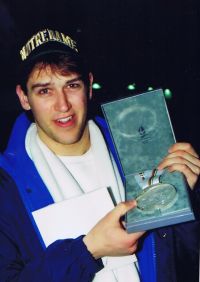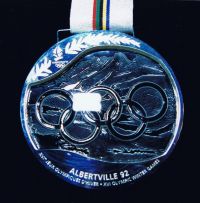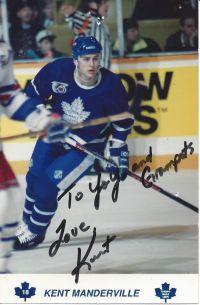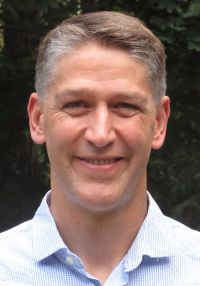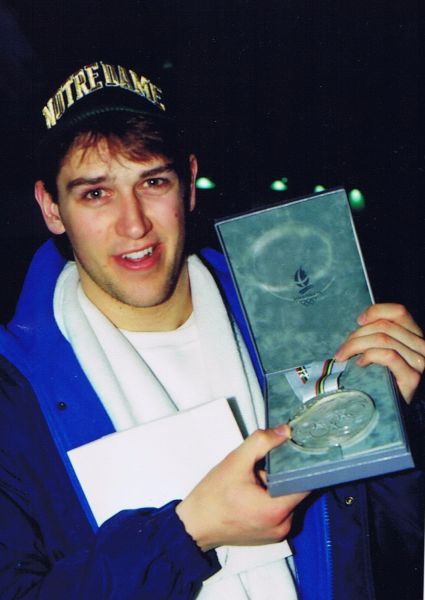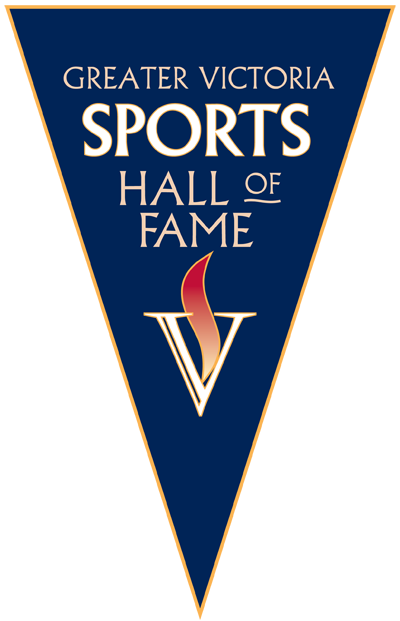The spark which led Kent Manderville to a National Hockey League career began in Redwater, Alberta, but the flame was lit by a next-door neighbour in Victoria.
Kent was born on April 12, 1971, in Edmonton but his hockey started in Redwater, population 1,450. Growing up without a father, Kent, his mother Irene, sister Dara and brother Brad moved to Victoria when he was nine. He attended Gordon Head Elementary and Cedar Hill Junior High schools and played baseball, soccer and volleyball and participated in track and field as well as cross-country. He was on the 1983 District 2 champion Gordon Head baseball team that advanced to the Little League provincial championship.
Kent was lucky to have great minor-hockey coaches at Oak Bay, Saanich and the Racquet Club of Victoria. But his biggest break was, as a 10-year-old, to have Dr. Howie Wenger, a decorated exercise physiologist, as a Paramount Place neighbour and hockey mentor. Then, as a 12-year-old, Kent watched the Soviet Union win hockey gold at the 1984 Winter Olympics in Sarajevo and thus began his dream of playing in the NHL.
Hockey took Kent to Wilcox, Saskatchewan and the prestigious Athol Murray College of Notre Dame, then Cornell University where he was the Eastern College Athletic Conference Rookie-of-the-Year in his first year there and where he met his wife, Kim.
In 1989, Kent was drafted 24th overall by Calgary Flames. The number one pick that year was Mats Sundin by the Quebec Nordiques and, interestingly, Kent was drafted ahead of no. 53 Nicklas Lidstrom and no. 74 Sergei Fedorov by Detroit Red Wings and no. 113 Pavel Bure by the Vancouver Canucks.
Before playing a NHL game, Kent was part of the 1990 and 1991 gold-medal Canadian teams at the World Junior championships. Then, on January 2, 1992, Kent was part of a 10-player trade between the Calgary Flames and the Toronto Maple Leafs.
That was a month before the Winter Olympics in Albertville, where Kent was part of the Canadian team which won silver, losing the gold-medal game to a Unified Team of newly-formed nations from the former Soviet Union, which had dissolved weeks before the Games began on February 8.
Soon after Albertville, Kent began his NHL career with the Maple Leafs and over a 12-season, 713-game career, he scored 40 goals and had 70 assists for 110 points. He played for Toronto, Edmonton, Hartford, Carolina, Philadelphia and Pittsburgh before leaving in 2003 and played in Sweden and Finland, retiring in 2007.
After hockey, Kent completed his Cornell business degree. Transitioning to a career in wealth management, he is working towards the Chartered Financial Analyst (CFA) designation and is focused on helping current professional athletes plan their financial affairs. In addition, he has given back to hockey by coaching minor hockey for a decade and is active with Hockey Helps the Homeless charity tournaments.
SPONSORED BY LITTLE & DAVIES / INSURANCE / FINANCIAL PLANNING
How did an accomplished young figure skater from Saskatoon come to meet and marry a scrappy Vancouver ice hockey player? Little did John Bate know that a dare from his work colleagues to join the Ice Capades in 1958 would have a profound impact on his life. Marilyn had been with the Ice Capades for a year and they toured North America and Russia together for five years before retiring to get married.
After their marriage, Marilyn worked as a Dental Assistant while John was Building Supervisor at the Pacific National Exhibition in the new Agrodome. They moved to Victoria in 1965 and John’s career really took off. His work accomplishments include: Assistant Manager of the Victoria Memorial Arena and later Royal Athletic Park, McPherson Playhouse and Royal Theatre and Manager at Crystal Pool. In 1970, John became Deputy Director of Recreation for the City of Victoria and in 1997, he retired as the Director of Parks and Recreation.
Marilyn’s and John’s accomplishments and community work are impressive. Separately and together, they have been involved in international, national and local sport competitions in figure skating, speed skating, fast pitch, basketball, lacrosse, ice hockey, curling, golf, darts, tennis, and soccer. They have been recognized many times by the Recreation Facilities Association of BC (R.F.A.B.C.). A few of their outstanding achievements include:
John
• 1967 – R.F.A.B.C. Manager of the Year Award
• 1968 – Award of Merit, R.F.A.B.C. for Meritorious Service
• 1982 - Facilities & Awards Chairman Air Canada Cup, National Hockey Championships.
• 1984 – Media Relations Vice-Chairman, Labatts’ Brier Men’s Canadian Curling Championships
• 1985 - Honorary President, R.F.A.B.C. Honour Roll
• 1988 - Certificate of Merit, Service to the Community, Government of Canada
• 1988 – Chairman, Celebration ’88 Olympic Torch Ceremony, Greater Victoria
• 1991& 93 – Chairman, Membership Committee, IAAM International Association Arena & Auditorium Managers
• 1991 – Charter Member and past President of the Greater Victoria Sports Hall of Fame (GVSHOF)
• 1993 – Life Membership Award, Recreation Facilities Association of BC
• 1994 - Co-Chair, Memorial Arena & Royal Athletic Park, 1994 Commonwealth Games
• 1994 to 2016 – Chairman, GVSHOF “Dobber Classic” Golf Tournament
• 1995 – Greater Victoria Sports Council Award in Recognition of Outstanding Contribution to the Sporting Community.
• 1995/96 – Board of Directors, Tourism Victoria
• 1999/2000 – Director of Sport, Victoria BC Summer Games
• 2016 - Honorary Life Member of the GVSHOF
Marilyn
• Treasurer, Hillside Park National Little League Baseball
• Secretary and Chairman, Vancouver Island Little League Baseball Association
• Public Relations Officer, Skate Canada and the Canadian Figure Skating Championships
• School District 61 parent representative and District Chair of the Adhoc Committee
• 1994 – R.F.A.B.C. Harry Atkinson Award
• Registrar, 22 years for the GVSHOF “Dobber Classic” Golf tournament
• 2016 - Honorary Life Member of the GVSHOF
For some people, Marilyn and John may best be known for their decorated home and yard at Christmas time. The Bates led the way in Victoria’s Annual Christmas spirit for over 30 years on “Candy Cane Lane.” Marilyn and John have a son, David and daughter, Lisa and 6 lovely grandchildren.
SPONSORED BY THE RECREATION FACILITIES ASSOCIATION OF BC
